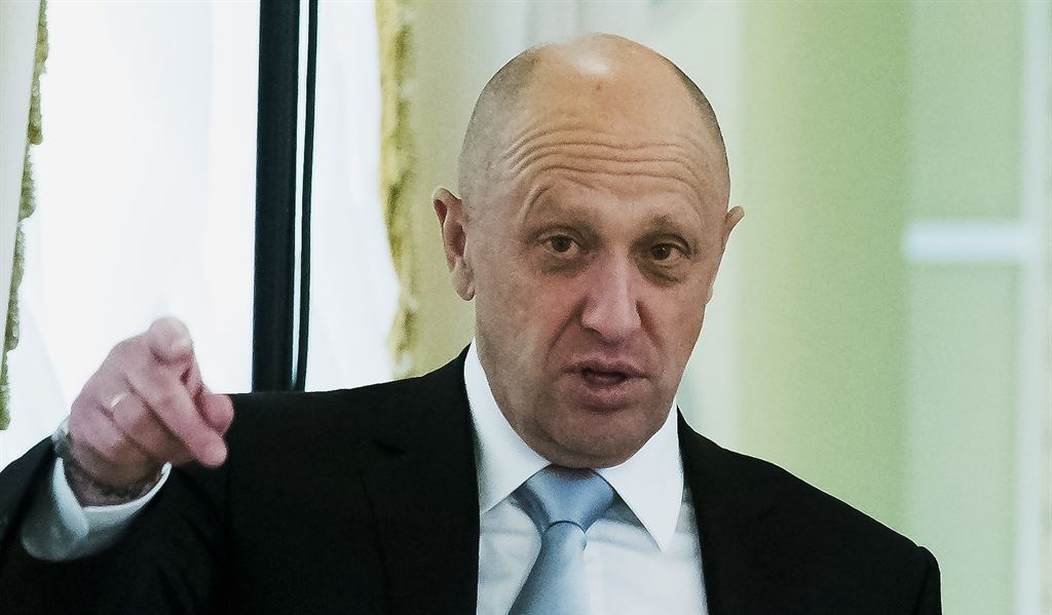The Russian Ministry of Defense says that the Wagner Group is preparing to hand over its heavy weapons — tanks and long-range artillery. This could mean that the private militia run by Yevgeny Prigozhin that mutinied against the Russian high command in Ukraine will soon disband.
Or will it? The Ministry gave the mutineers a deadline of July 1 to disarm themselves. And while Prigozhin and some of his men have already fled to Belarus under the protection of President Alexander Lukashenko, how safe can they really be? Prigozhim humiliated Vladimir Putin and threatened his hold on power. Previous regime opponents ended up poisoned or shot.
The over-under on Prigozhin’s lifespan is six months. I’m taking the under and doubling down.
Meanwhile, Putin tried to make the best of a horrible situation. He gathered his security chiefs in the main square inside the Kremlin and congratulated them on “sheltering our Motherland from shocks, and in fact stopping civil war.”
In fact, it was threats against Prigozhin’s family that forced Wagner to turn around and head back to Rostov-on-Don. The rest of the Russian military that confronted Wagner did little to stop their advance.
Related: What the Hell Just Happened in Russia?
Despite the promises of amnesty from Putin for Wagner soldiers and leaders, the situation that led to the mutiny in the first place hasn’t changed. While Russian troops appear to be performing better during the counteroffensive being conducted by Ukraine, no one knows the effect on the morale of the conscripts, who are fully aware of the mutiny. And the same Russian military commanders that Prigozhin bitterly denounced in a video statement on Saturday are still serving.
Putin tried to use Wagner as a hedge against disloyalty in the regular army. Prigozhin was one of Putin’s closest allies and the fact that Wagner as a fighting unit has been basically defanged leaves Putin even more vulnerable than he has been previously.
That includes an incident during Wagner’s “March for Justice” toward Moscow. Putin unleashed his air force on Wagner’s columns of armor — and lost several aircraft:
- 1 assault helicopter Ka-52
- 1 multi-purpose helicopter Mi-8
- 3 Electric Warfare helicopters
- 1 transport helicopter
- and 1 aerial command point plane IL-18.
Putin pardoned the Wagner troops who fired on the aircraft — much to the chagrin of the Russian military.
“The main gratitude and the direct responsibility of the state toward pilots who fulfilled their duty and sacrificed their lives to save the Motherland would be the inevitable and severe punishment of their murderers. In accordance with the laws of the Russian Federation,” commented Fighterbomber, a Telegram channel with nearly 400,000 followers that, according to the Wall Street Journal, “usually reflects the thinking of Russian Air Force officers.”
In the end, Wagner as an independent force had become too big a threat to Putin to be allowed an independent existence.
Integrating Wagner into the regular Russian military would “lead to the complete loss of combat capacity,” Prigozhin said. “Experienced fighters and commanders will be spread around and turned into cannon fodder, unable to use their combat potential and their combat experience.”
Still, he said, Wagner was planning to drive to Russia’s Southern Military District headquarters in Rostov and publicly hand over its heavy weapons on June 30—a plan that, he said, had been scuttled by the Russian military’s attack on Wagner camps Friday. Some 30 Wagner fighters were killed in those missile and helicopter strikes, he said.
American officials are not convinced the crisis in Russia is over, either.
“This is an unfolding story,” Blinken said Sunday during an interview on CBS’s Face the Nation. “We haven’t seen the last act. We’re watching it very closely.”
Actually, Blinken nails the precarious position in which Putin has found himself.
“Sixteen months ago, Russian forces were on the doorstep of Kyiv in Ukraine, thinking they’d take the city in a matter of days, thinking they would erase Ukraine from the map as an independent country,” Blinken said. “Now, over this weekend, they’ve had to defend Moscow, Russia’s capital, against mercenaries of Putin’s own making.”
“Prigozhin himself, in this entire incident, has raised profound questions about the very premises for Russia’s aggression against Ukraine in the first place,” Blinken added.
The final chapter in the Putin-Prigozhin story is likely to end with a whimper rather than a bang.










